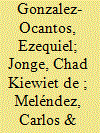| Srl | Item |
| 1 |
ID:
170805


|
|
|
|
|
| Summary/Abstract |
How do parties target intimidation and vote-buying during elections? Parties prefer the use of carrots over sticks because they are in the business of getting voters to like them and expect higher legitimacy costs if observers expose intimidation. However, their brokers sometimes choose intimidation because it is cheaper and possibly more effective than vote-buying. Specifically, we contend that brokers use intimidation when the cost of buying votes is prohibitively high; in interactions with voters among whom the commitment problem inherent to clientelistic transactions is difficult to overcome; and in contexts where the risk of being denounced for violence is lower. We probe our hypotheses about the different profile of voters targeted with vote-buying and intimidation using two list experiments included in an original survey conducted during the 2011 Guatemalan general elections. The list experiments were designed to overcome the social desirability bias associated with direct questions about illegal or stigmatized behaviors. Our quantitative analysis is supplemented by interviews with politicians from various parties. The analysis largely confirms our expectations about the diametrically opposed logics of vote-buying and intimidation targeting, and illuminates how both are key components of politics in a country with weak parties and high levels of violence.
|
|
|
|
|
|
|
|
|
|
|
|
|
|
|
|
| 2 |
ID:
163271


|
|
|
|
|
| Summary/Abstract |
Many norms develop in the absence of clear templates for how to implement them. I argue that, even under these conditions, individuals and organizations can still successfully push for new norms, along with attendant changes in state practices. They do so through a mode of action that I term communicative entrepreneurship. Unlike norm entrepreneurs, communicative entrepreneurs do not project normative or technocratic certainty. They use nudges and networking strategies to trigger debates that define the contours of emerging normative scripts. I illustrate this dynamic with the case of the Inter-American Court of Human Rights, which became interested in regulating the use of its jurisprudence by local judges. Lacking a script amenable for diffusion, it triggered a dialogue with national courts to jointly regulate citation practices, and more generally, judges’ obligations with respect to international human rights jurisprudence. Using original interviews and other sources, I trace the impact of communicative entrepreneurship on the behavior of Mexican and Colombian high courts. I show that it led to the development of new judicial decision-making standards in two very different contexts and therefore bolstered the authority of the Inter-American Court.
|
|
|
|
|
|
|
|
|
|
|
|
|
|
|
|